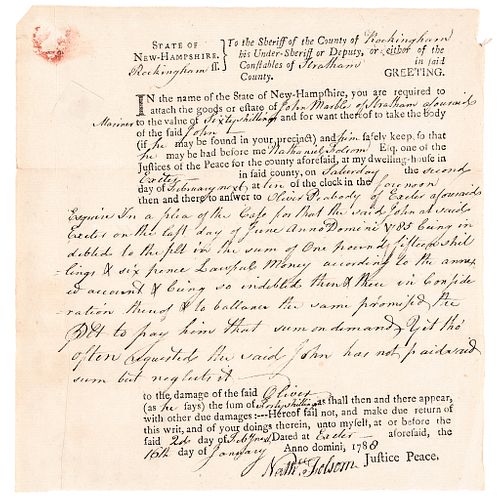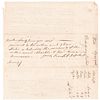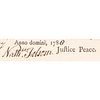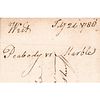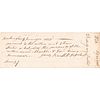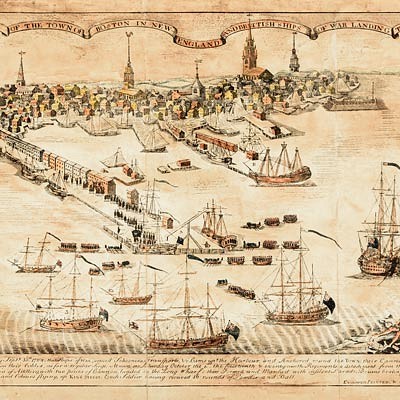NATHANIEL FOLSOM Document Signed, NH. Founding Father + Rev. War Major General
Lot 30
Categories
Estimate:
$800 - $1,000
Absentee vs Live bid
Two ways to bid:
- Leave a max absentee bid and the platform will bid on your behalf up to your maximum bid during the live auction.
- Bid live during the auction and your bids will be submitted real-time to the auctioneer.
Bid Increments
| Price | Bid Increment |
|---|---|
| $0 | $10 |
| $200 | $20 |
| $300 | $25 |
| $500 | $50 |
| $1,000 | $100 |
| $2,000 | $200 |
| $3,000 | $250 |
| $5,000 | $500 |
| $10,000 | $1,000 |
| $20,000 | $2,000 |
| $30,000 | $2,500 |
| $50,000 | $5,000 |
| $100,000 | $10,000 |
| $200,000 | $20,000 |
| $300,000 | $25,000 |
| $500,000 | $50,000 |
About Auction
By Early American History Auctions
Mar 20, 2021
Set Reminder
2021-03-20 12:00:00
2021-03-20 12:00:00
America/New_York
Bidsquare
Bidsquare : Autographs-Colonial-Political-Americana
https://www.bidsquare.com/auctions/early-american-history-auctions/autographs-colonial-political-americana-6509
330 Lots of Rare, Historic Autographs, Americana, Civil War Era, George Washington, Abraham Lincoln, Slavery & Black History, Revolutionary War Era, Colonial America, Federal Period, War of 1812, Colonial Currency, Indian Peace Medals & more... Early American History Auctions auctions@earlyamerican.com
330 Lots of Rare, Historic Autographs, Americana, Civil War Era, George Washington, Abraham Lincoln, Slavery & Black History, Revolutionary War Era, Colonial America, Federal Period, War of 1812, Colonial Currency, Indian Peace Medals & more... Early American History Auctions auctions@earlyamerican.com
- Lot Description
Autographs
Nathaniel Folsom Member of Continental Congress New Hampshire "Founding Father" and General of Militia
NATHANIEL FOLSOM (1726-1790). Fought in the French and Indian War and the American Revolution; Member & Delegate for New Hampshire in the Continental Congress in 1774 and 1777 to 1780; Major General of the New Hampshire Militia.
January 16, 1788-Dated Federal Period, Partially-Printed Court Document Signed, "Nath.el Folsom" as judge, 1 page, measuring 7.5" x 8", being well printed and written on period laid paper with watermark, Choice Very Fine. Nathaniel Folsom was a New Hampshire merchant and patriot, was a veteran of the French and Indian War serving with New Hampshire troops at Lake George and Crown Point. He was chosen a Delegate to the Continental Congress in 1774 and served until 1777 and he was made a Major General of Militia in the Revolutionary War, then later became the Chief Judge of the Court of Rockingham County. This choice quality Document reads, in part:
"In the name of the State of New Hampshire you are required to attached the goods and estate of John Marble of Stratham ... to the value of sixty shillings and for want thereof to take the body of the said John (if he may be found in your precinct) and him safely keep, so that he may be had before me Nathaniel Folsom, Esq., one of the Justices of the Peace for the county aforesaid, at my dwelling-house in Exeter in said county, on Saturday the second day of February next at ten of the clock in the forenoon.... (Signed) Nath.el Folsom, Justice Peace."
Docket on verso. Light remnant of original wax seal in upper left. An interesting Document with a nice autograph from one of New Hampshire's "Founding Fathers" and a Revolutionary War Major General of the New Hampshire Militia. Scarce.
Folsom was born into a large family in Exeter, New Hampshire. His ancestors were among Exeter's earliest settlers, having arrived with the Gilman family, to whom they were related, from Hingham, Massachusetts, where both families settled for a time before moving on to New Hampshire. The original spelling of the family name was Foulsham. The Folsoms continued to hold land outside Hingham, Norfolk, England, many years after leaving for the Massachusetts Bay Colony.
Folsom joined the militia as did most young men. During the French and Indian War he was captain of a company in the New Hampshire Provincial Regiment during the Crown Point expedition led by Sir William Johnson in 1755. At the Battle of Lake George, his company, supported by artillery from Massachusetts surprised and captured Baron Dieskau, the French commander-in-chief. Besides capturing the Baron, they dispersed the French troops, took the French baggage train and seized a critical mass of supplies, with the loss of only six men.
Folsom went on to become a colonel in the militia. His formal commission was revoked by Governor Wentworth after the raid on Fort William and Mary in December 1774. Disregarding this, Colonel Folsom marched his regiment to Portsmouth, and escorted the captured cannons safely back to Durham.
On May 29, 1775, the Provincial Congress named him a brigadier general in command of New Hampshire's forces. This created some confusion, as the Massachusetts provisional government had named John Stark to the same position. At the time, Colonel Stark was the senior commander of the New Hampshire men who had marched to the Siege of Boston. The confusion was resolved in June, when the Continental Congress named John Sullivan general of those New Hampshire forces in service with the Continental Army. Folsom was the senior officer for militia forces within the state. He was later named a major general, and continued recruiting, training, and supply efforts throughout the war.
Folsom had served several years as moderator of the town meetings at Exeter. When a revolutionary Assembly, the Provincial Congress, first met on July 21, 1774, he was a delegate. The Provincial Congress, in turn named him their delegate to the first Continental Congress that met in Philadelphia, Pennsylvania.
In 1775, Folsom continued his service in the provincial congress, as he would do until 1783. He became a close political ally of Meshech Weare and Josiah Bartlett, as he was named to the New Hampshire Committee of Safety. In January 1776, he also became a justice in the Rockingham County court of common pleas. In 1777 and 1779 he was also returned to his old post as a delegate to the Continental Congress.
In 1783 he became the Chief Judge in the common pleas court. That same year he went to, and presided over, the state's constitutional convention. When a constitution was adopted, as president of the convention, he wrote a cover letter, then forwarded it to the towns for ratification. Ironically, one problem addressed by the constitution was to limit the number of offices held by one man. Folsom resigned from the Assembly, and as head of the militia, and from the Governor's Council.
He held the job of chief judge in Rockingham County until his death in Exeter on May 26, 1790. He is buried in Exeter's Winter Street Cemetery.
Our Auction Contents:
Black History & Slavery: (Lots 1 - 63)
Abraham Lincoln Related: (Lots 64 - 74)
Historic Autographs: (Lots 75 - 235)
Colonial America: (Lots 236 - 261)
Revolutionary War: (Lots 262 - 304)
George Washington Related: (Lots 305 - 306)
Early American Guns & Weapons: (Lots 307 - 318) - Shipping Info
-
Early American provides in-house worldwide shipping. Please contact us directly if you have questions about your specific shipping requirements.
-
- Buyer's Premium



 EUR
EUR CAD
CAD AUD
AUD GBP
GBP MXN
MXN HKD
HKD CNY
CNY MYR
MYR SEK
SEK SGD
SGD CHF
CHF THB
THB